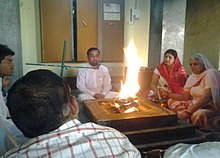Arya Samaj
The Arya Samaj ( sanskr .: community of the Aryans ) is an orthodox reform movement of Hinduism , which was founded in 1875 by Mula Shankara (spiritual name Dayananda Saraswati ) in Bombay (today Mumbai ). The Arya Samaj is considered to be an origin for the emergence of modern Hindu fundamentalism .
The Theosophical Society , founded in New York in 1875 , merged from 1879 to 1881 with the Arya Samaj in Adyar near Chennai.
Teaching and Duties
The main concern was to fight against image worship in Hinduism, ritualism, social grievances and anything that contradicted the pure teaching of the Veda . The organization was founded in Bombay, but through Dayananda's travels found supporters, especially in Punjab . These were mostly young men who had enjoyed a modern upbringing. Because caste-lowerers could join after certain purification ceremonies, however, the organization drew the disapproval of the more conservative.
All Unvedic teachings were called heresies. The creed goes as follows: God ( Parameshvara , the supreme Lord) is the first cause of all true knowledge. He is essentially Saccidananda , true being, supreme consciousness, and bliss. He is formless, omnipotent, righteous, gracious, unborn, infinite, unchangeable and incomparable. He is the foundation and the Lord of everything, omnipresent, immanent, eternal and pure. He is the Creator and alone worthy of worship.
The Veda is the source of true knowledge. It is paramount to read, hear and pass on these texts. Members are obliged to follow the Dharma (law), promote the welfare of the world, treat all beings with love and justice, and combat ignorance.
In his interpretation of the Veda, Dayananda claimed that it contained all knowledge, including that of modern science, in an encrypted form. The Veda is a blueprint of creation. With this view, Dayananda influenced many movements that followed him. So associated e.g. B. the movement Maharishi Mahesh Yogis Vedic hymns with parts of human physiology.
In practice, however, post-Vedic texts such as the Manusmriti are also used. Yoga , good works, love of true knowledge, visiting wise men, purity of mind, and an active life can also lead to salvation.
The Arya Samaj points out the falseness of all other religions, which in his opinion have their origin in the departure from "Vedic monotheism". Dayananda wants a cleansing of alien elements, such as image worship, ancestor worship , untouchability , sati , child marriage , animal sacrifice , priesthood and temple service. God should be worshiped without symbols through praise, prayer and meditation . Correct devotion to God ( devapuja ) consists in showing due respect to wise men, parents, teachers and all virtuous people. The old Vedic fire ritual ( Agnihotra ) is an integral part of the worship of God.
This is where the importance of the five daily duties rests:
- Brahmayajna (Veda study and meditation)
- Devayajna (burning of Ghi and fragrant substances in the sacred fire, worshiping persons of respect)
- Social services (hosting hiking ascets, serving food to those in need)
- Washings before meditation, recitation of Gayatri ( mantra ), contemplation
- Divine service (at the Vedic fireplace)
The community has no priests. Dayananda initially published in Sanskrit , later in Hindi . In 1931 the Arya Samaj already had one million members.
The Arya Samaj also allows Westerners to become Hindus and performs the appropriate rites on them. The repetition of the Gayatri mantra, according to the orthodox-Hindu view only the Brahmins are allowed, is part of the religious duties of every Hindu. The organization is based in Delhi , India.
Web links
Individual evidence
- ^ Hans-Jürgen Ruppert : Theosophy. On the way to the occult superman . Friedrich Bahn, Konstanz 1993, p. 17f.
- ↑ Horst E. Miers : Lexicon of Secret Knowledge (= Esoteric. Vol. 12179). Original edition; and 3rd updated edition, both Goldmann, Munich 1993, ISBN 3-442-12179-5 , p. 72.
- ^ Robert J. Stephens: Hinduism in Independent India. Fundamentalism and Secularism. In: Robin Rinehard (Ed.): Contemporary Hinduism: Ritual, Culture, and Practice. ABC-Clio, 2004, p. 315
- ↑ See Hans-Jürgen Ruppert : Theosophie. On the way to the occult superman . Friedrich Bahn, Konstanz 1993, p. 17.
- ^ The importance of the Vedic practice of agnihotra. Arya Samaj's website, accessed on February 25, 2017.
